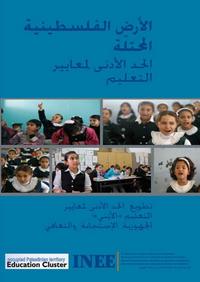Resources
Request support on coordination, information management, capacity development or other education in emergencies areas.
Demande de soutien en coordination, gestion de l’information, développement des capacités et autres domaines de l'éducation en situation d'urgence.
لطلب الدعم في مجال التنسيق ، إدارة المعلومات ، تنمية القدرات أو في اي مجال من مجالات التعليم في مناطق الطوارئ
Solicitar apoyo en coordinación, gestión de la información, desarrollo de capacidades u otra áreas en educación en emergencias.
Featured Resources
below you can find selected tools

COVID-19 Resources
View resources to support education in emergencies coordination during the COVID-19 pandemic.

Guidance on Education Cluster Co-Leadership Arrangements at the Country Level
Indicative Guidance for the establishment and management of co-leadership arrangements at the country level.

Inter-agency Network for Education in Emergencies
For technical education in emergencies resources, please visit the INEE website.
Schools under Attack in Syria: A monitoring report on the impact of attacks on Syrian schools by the Southern Turkey Education Cluster (Syria response)
Syria is one of the most heavily affected countries by attacks on education.In Syria, schools arebombed, damaged, looted and destroyed on a regular basis, many places of learning are now deserted as children and teachers flee to safety.Since the conflict began, more than 4,200 schoolshave been…
- Communicaiton: Communication Materials
- Coordination: Advocacy
- Emergency: Conflict, Complex
- HPC: Implementation & Monitoring, Resource Mobilisation
- Technical Areas: Attacks on Education, Protection
Monsoon / Cyclone / Landslide / Flood Key Messages for Temporary Learning Centre Facilitators and Students
The Bangladesh Education Cluster developed Key Messages for Temporary Learning Center facilitators and students. During the monsoon season, all students should be told, and regularly reminded of, the key messages in this document. Facilitators Should reinforce these messages regularly through role…
- Coordination: Coordination, Advocacy
- Emergency: Floods, Typhoon / Cyclone
- HPC: Implementation & Monitoring
Cluster Education Tchad Termes de Référence
In order to provide a coordinated response in accordance with the humanitarian reform and especially the guidelines of the Permanent Inter Agency Committee (IASC), the cluster approach was active in Chad including the education cluster. It aims to ensure a logical and effective preparation and…
- Coordination: Coordination, Cluster Management, Leadership
- Emergency: Conflict, Displacement
- Emergency: Complex
- HPC: Strategic Planning
- Communicaiton: Communication Materials
- Coordination: Advocacy
- Emergency: Conflict, Complex, Displacement
Schools Under Attack in Syria
A monitoring report on the impact of attacks on Syrian schools by the Southern Turkey Education Cluster (Syria response)
- Communicaiton: Communication Materials
- Coordination: Advocacy
- Emergency: Conflict, Complex
- HPC: Implementation & Monitoring, Resource Mobilisation
- Technical Areas: Attacks on Education, Protection
Contextualised INEE Minimum Standards for Occupied Palestinian Territories
Contextualised INEE Minimum Standards for Palestine in Arabic.
- Coordination: Coordination
- Emergency: Conflict
- HPC: Implementation & Monitoring, Needs Assessment & Analysis, Operational Peer Review and Evaluation, Resource Mobilisation, Strategic Planning
- Technical Areas: INEE Minimum Standards
Pakistan MIRA Provincial Assessment Working Group Terms of Reference
Pakistan is prone to repeated crisis which impact the well being of the population. In order to understand the impact of the crisis on the population, to understand their needs, identify their location, and develop an appropriate response to their needs, it is necessary to carry out an assessment.…
- Coordination: Cluster Management, Needs Assessment
- Emergency: Floods
- HPC: Needs Assessment & Analysis
Pakistan MIRA Code of Conduct Agreement
This code of conduct provides basic standards in relation to interviewing and documenting information as part of the Multi-cluster Initial Rapid Assessment (MIRA) of the areas where disaster occurs in Pakistan. The principles laid down in this code of conduct are to safeguard the best interests of…
- Coordination: Needs Assessment
- Emergency: Floods
- HPC: Needs Assessment & Analysis
Education Cluster in Pakistan: Lessons Learned Flood Response
The Global Education Cluster commissioned a lessons learned exercise covering the period from the start of the floods in July until March 2010. This report outlines the main findings from this review and highlights a number of recommendations
- Coordination: Knowledge Mangement
- Emergency: Floods
- HPC: Operational Peer Review and Evaluation
Filter results
Communication(selected )
Coordination(selected )
Country(selected )
Emergency(selected )
Humanitarian Programme Cycle(selected )
Language(selected )
Publication Date(selected )
Publisher(selected )
Resource Type(selected )
Technical Areas(selected )
Can’t find what you’re looking for?
Contact your relevant language Help Desk










